Related Research Articles
John de Gray or de Grey was an English prelate who served as Bishop of Norwich, and was elected but unconfirmed Archbishop of Canterbury. He was employed in the service of Prince John even before John became king, for which he was rewarded with a number of ecclesiastical offices, culminating in his pro forma election to Norwich in 1200. De Gray continued in royal service after his elevation to the episcopate, lending the King money and undertaking diplomatic missions on his behalf. In 1205 King John attempted to further reward de Gray with a translation to the archbishopric of Canterbury, but a disputed election process led to de Gray's selection being quashed by Pope Innocent III in 1206.
Richard was a medieval Benedictine monk and Archbishop of Canterbury. Employed by Thomas Becket immediately before Becket's death, Richard arranged for Becket to be buried in Canterbury Cathedral and eventually succeeded Becket at Canterbury in a contentious election. Much of Richard's time as archbishop was spent in a dispute with Roger de Pont L'Evêque, the Archbishop of York over the primacy of England, and with St Augustine's Abbey in Canterbury over the archbishop's jurisdiction over the abbey. Richard had better relations with King Henry II of England than Becket had, and was employed by the king on diplomatic affairs. Richard also had the trust of the papacy, and served as a judge for the papacy. Several of his questions to Pope Alexander III were collected into the Decretals, a collection of ecclesiastical laws, and his patronage of canon lawyers did much to advance the study of canon law in England.
Geoffrey Ridel was the nineteenth Lord Chancellor of England, from 1162 to 1173.
Eustace was the twenty-third Lord Chancellor of England, from 1197 to 1198. He was also Dean of Salisbury and Bishop of Ely.
Hugh de Puiset was a medieval Bishop of Durham and Chief Justiciar of England under King Richard I. He was the nephew of King Stephen of England and Henry of Blois, who both assisted Hugh's ecclesiastical career. He held the office of treasurer of York for a number of years, which led him into conflict with Henry Murdac, Archbishop of York. In 1153, Hugh was elected bishop of Durham despite the opposition of Murdac.

Thomas of Bayeux was Archbishop of York from 1070 until 1100. He was educated at Liège and became a royal chaplain to Duke William of Normandy, who later became King William I of England. After the Norman Conquest, the king nominated Thomas to succeed Ealdred as Archbishop of York. After Thomas' election, Lanfranc, Archbishop of Canterbury, demanded an oath from Thomas to obey him and any future Archbishops of Canterbury; this was part of Lanfranc's claim that Canterbury was the primary bishopric, and its holder the head of the English Church. Thomas countered that York had never made such an oath. As a result, Lanfranc refused to consecrate him. The King eventually persuaded Thomas to submit, but Thomas and Lanfranc continued to clash over ecclesiastical issues, including the primacy of Canterbury, which dioceses belonged to the province of York, and the question of how York's obedience to Canterbury would be expressed.

Roger de Pont L'Évêque was Archbishop of York from 1154 to 1181. Born in Normandy, he preceded Thomas Becket as Archdeacon of Canterbury, and together with Becket served Theobald of Bec while Theobald was Archbishop of Canterbury. While in Theobald's service, Roger was alleged to have committed a crime which Becket helped to cover up. Roger succeeded William FitzHerbert as archbishop in 1154, and while at York rebuilt York Minster, which had been damaged by fire.
Henry Murdac was abbot of Fountains Abbey and Archbishop of York in medieval England.
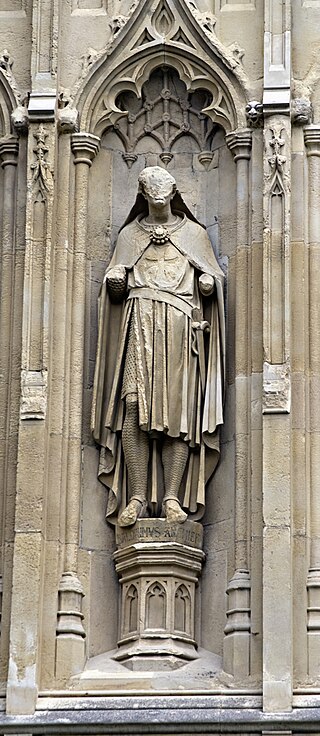
Baldwin of Forde or Ford was Archbishop of Canterbury between 1185 and 1190. The son of a clergyman, he studied canon law and theology at Bologna and was tutor to Pope Eugene III's nephew before returning to England to serve successive bishops of Exeter. After becoming a Cistercian monk he was named abbot of his monastery at Forde and subsequently elected to the episcopate at Worcester. Before becoming a bishop, he wrote theological works and sermons, some of which have survived.

Reginald Fitz Jocelin was a medieval Bishop of Bath and an Archbishop of Canterbury-elect in England. A member of an Anglo-Norman noble family, he was the son of a bishop, and was educated in Italy. He was a household clerk for Thomas Becket, but by 1167 he was serving King Henry II of England. He was also a favourite of King Louis VII of France, who had him appointed abbot of the Abbey of Corbeil. After Reginald angered Becket while attempting to help negotiate a settlement between Becket and the king, Becket called him "that offspring of fornication, that enemy to the peace of the Church, that traitor." When he was elected as a bishop, the election was challenged by King Henry's eldest son, Henry the Young King, and Reginald was forced to go to Rome to be confirmed by Pope Alexander III. He attended the Third Lateran Council in 1179, and spent much of his time administering his diocese. He was elected Archbishop of Canterbury in 1191, but died before he could be installed.
Gerard la Pucelle was a peripatetic Anglo-French scholar of canon law, clerk, and Bishop of Coventry.
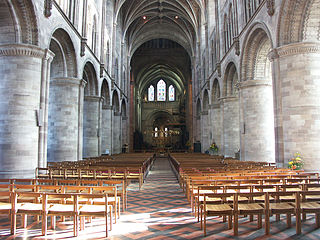
Gilbert Foliot was a medieval English monk and prelate, successively Abbot of Gloucester, Bishop of Hereford and Bishop of London. Born to an ecclesiastical family, he became a monk at Cluny Abbey in France at about the age of twenty. After holding two posts as prior in the Cluniac order he was appointed Abbot of Gloucester Abbey in 1139, a promotion influenced by his kinsman Miles of Gloucester. During his tenure as abbot he acquired additional land for the abbey, and may have helped to fabricate some charters—legal deeds attesting property ownership—to gain advantage in a dispute with the Archbishops of York. Although Foliot recognised Stephen as the King of England, he may have also sympathised with the Empress Matilda's claim to the throne. He joined Matilda's supporters after her forces captured Stephen, and continued to write letters in support of Matilda even after Stephen's release.
Ælfric of Abingdon was a late 10th-century Archbishop of Canterbury. He previously held the offices of abbot of St Albans Abbey and Bishop of Ramsbury, as well as likely being the abbot of Abingdon Abbey. After his election to Canterbury, he continued to hold the bishopric of Ramsbury along with the archbishopric of Canterbury until his death in 1005. Ælfric may have altered the composition of Canterbury's cathedral chapter by changing the clergy serving in the cathedral from secular clergy to monks. In his will he left a ship to King Æthelred II of England as well as more ships to other legatees.
Leofwin was a medieval Bishop of Lichfield.

Walter Durdent was Bishop of Coventry from 1149 to 1159.
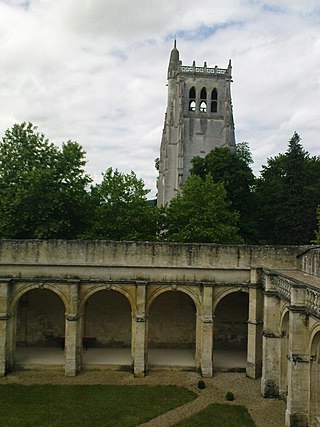
Hugh Nonant was a medieval Bishop of Coventry in England. A great-nephew and nephew of two Bishops of Lisieux, he held the office of archdeacon in that diocese before serving successively Thomas Becket, the Archbishop of Canterbury and King Henry II of England. Diplomatic successes earned him the nomination to Coventry, but diplomatic missions after his elevation led to a long delay before he was consecrated. After King Henry's death, Nonant served Henry's son, King Richard I, who rewarded him with the office of sheriff in three counties. Nonant replaced his monastic cathedral chapter with secular clergy, and attempted to persuade his fellow bishops to do the same, but was unsuccessful. When King Richard was captured and held for ransom, Nonant supported Prince John's efforts to seize power in England, but had to purchase Richard's favour when the king returned.
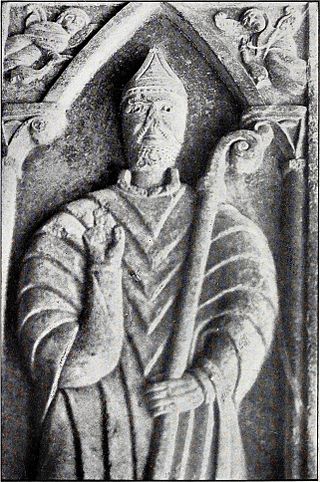
Bartholomew of Exeter was a medieval Bishop of Exeter. He came from Normandy and after being a clerk of the Archbishop of Canterbury, was made Archdeacon of Exeter in 1155. He became Bishop of Exeter in 1161. Known for his knowledge of canon law, he was involved in the Becket controversy after the appointment of Thomas Becket as Archbishop of Canterbury. After Becket's death, although he was frequently at the royal court, he mainly attended to his diocese. A number of works by him survive, including sermons and treatises on law and theology.
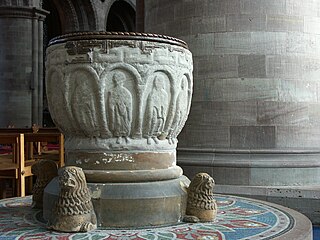
Robert Foliot was a medieval Bishop of Hereford in England. He was a relative of a number of English ecclesiastics, including Gilbert Foliot, one of his predecessors at Hereford. After serving Alexander, Bishop of Lincoln as a clerk, he became a clerk of Henry of Blois, the Bishop of Winchester and brother of King Stephen of England. He attended the Council of Reims in 1148, where another relative, Robert de Chesney, was elected as Bishop of Hereford. Chesney then secured the office of Archdeacon of Oxford for Foliot.
Robert de Chesney was a medieval English Bishop of Lincoln. He was the brother of an important royal official, William de Chesney, and the uncle of Gilbert Foliot, successively Bishop of Hereford and Bishop of London. Educated at Oxford or Paris, Chesney was Archdeacon of Leicester before his election as bishop in December 1148.
William of Northall was a mediaeval Bishop of Worcester.
References
- Barlow, Frank (1986). Thomas Becket . Berkeley, CA: University of California Press. ISBN 0-520-07175-1.
- Franklin, M. J. (2004). "Peche, Richard". Oxford Dictionary of National Biography (online ed.). Oxford University Press. doi:10.1093/ref:odnb/21733.(Subscription or UK public library membership required.)
- Fryde, E. B.; Greenway, D. E.; Porter, S.; Roy, I. (1996). Handbook of British Chronology (Third revised ed.). Cambridge, UK: Cambridge University Press. ISBN 0-521-56350-X.
- Knowles, David (1976). The Monastic Order in England: A History of its Development from the Times of St. Dunstan to the Fourth Lateran Council, 940–1216 (Second reprint ed.). Cambridge, UK: Cambridge University Press. ISBN 0-521-05479-6.
- O'Mahony, Charles (1912). The Viceroys of Ireland.